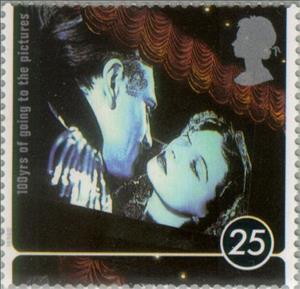Stamp: Laurence Olivier and Vivian Leigh in "Lady Hamilton" (film) (United Kingdom of Great Britain & Northern Ireland 1996)
Laurence Olivier and Vivian Leigh in "Lady Hamilton" (film) (United Kingdom of Great Britain & Northern Ireland 1996)
16 April (United Kingdom of Great Britain & Northern Ireland ) within release Centenary of the Cinema goes into circulation Stamp Laurence Olivier and Vivian Leigh in "Lady Hamilton" (film) face value 25 British penny
| Stamp Laurence Olivier and Vivian Leigh in "Lady Hamilton" (film) in catalogues | |
|---|---|
| Michel: | Mi:GB 1621 |
| Yvert et Tellier: | Yt:GB 1867 |
| Stanley Gibbons: | Sg:GB 1921 |
| AFA number: | AFA:GB 1782 |
Stamp is horizontal format.
Also in the issue Centenary of the Cinema:
- Stamp - The Odeon, Harrogate face value 19;
- Stamp - Laurence Olivier and Vivian Leigh in "Lady Hamilton" (film) face value 25;
- Stamp - Old Cinema Ticket face value 30;
- Stamp - Pathé News Still face value 35;
- Stamp - Cinema sign, The Odeon, Manchester face value 41;
Stamp Laurence Olivier and Vivian Leigh in "Lady Hamilton" (film) it reflects the thematic directions:
A film (British English) – also called a movie (American English), motion picture, moving picture, picture, photoplay or (slang) flick – is a work of visual art that simulates experiences and otherwise communicates ideas, stories, perceptions, feelings, beauty, or atmosphere through the use of moving images. These images are generally accompanied by sound and, more rarely, other sensory stimulations. The word "cinema", short for cinematography, is often used to refer to filmmaking and the film industry, and the art form that is the result of it. form that is the result of it.
An actor (or actress for females) is a person who portrays a character in a performance. The actor performs "in the flesh" in the traditional medium of the theatre, or in modern mediums such as film, radio, and television. The analogous Greek term is ὑποκριτής (hupokritḗs), literally "one who answers". The actor's interpretation of their role pertains to the role played, whether based on a real person or fictional character. Interpretation occurs even when the actor is "playing themselves", as in some forms of experimental performance art, or, more commonly; to act, is to create, a character in performance.
An anniversary is the date on which an event took place or an institution was founded in a previous year, and may also refer to the commemoration or celebration of that event. For example, the first event is the initial occurrence or, if planned, the inaugural of the event. One year later would be the first anniversary of that event. The word was first used for Catholic feasts to commemorate saints. Most countries celebrate national anniversaries, typically called national days. These could be the date of independence of the nation or the adoption of a new constitution or form of government. The important dates in a sitting monarch's reign may also be commemorated, an event often referred to as a "Jubilee".



